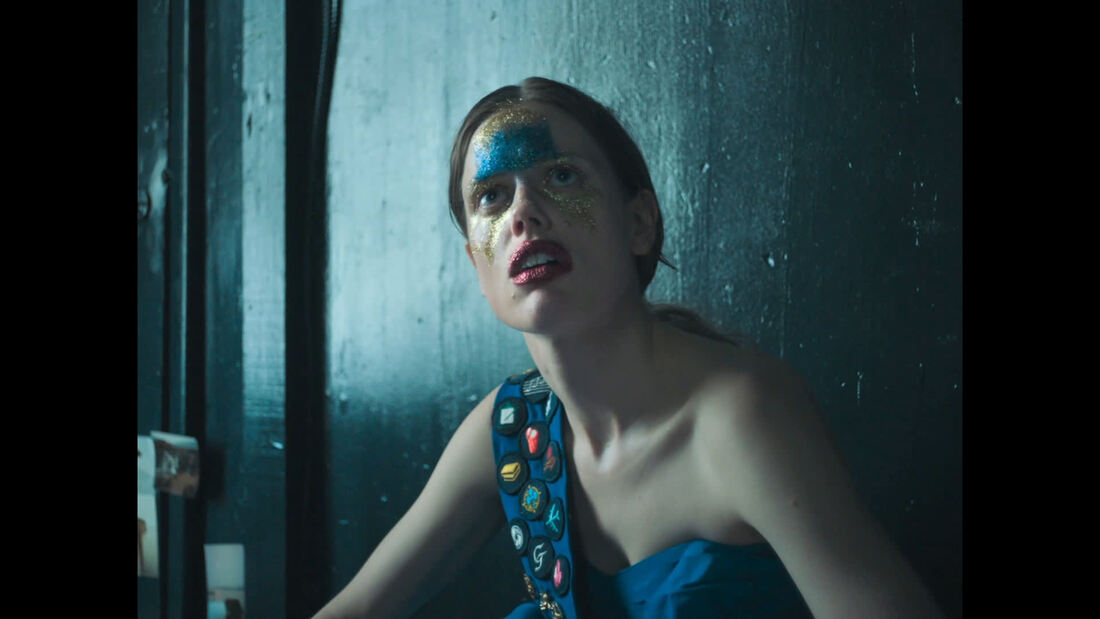|
Kelly McCormack in Sugar Daddy (2021) The Canadian Film Fest (CFF) is a non-profit organization devoted to the celebration, promotion and advancement of Canadian filmmaking talent. 🇨🇦 CFF celebrates its 15th anniversary this year, and brings audiences a selection of Canadian independent films (features and shorts) through a virtual festival experience. Kicking off the festival was the Toronto premiere of Wendy Morgan’s feature film Sugar Daddy, written by and starring Kelly McCormack. Read the full review below!
With an emotionally resonating and layered story at its core, Sugar Daddy is an experimental gem in filmmaking. This film explores a specific moment in a young woman’s life where she feels conflicted about her own voice and seeks approval outside of her self. The protagonist, Darren (Kelly McCormack), dreams of becoming a musician but doesn’t have the time nor money she wants to fully create. She works multiple part-time jobs from catering to babysitting, anything she can find to pay the rent. At one particular catering gig, Darren meets a woman whose college tuition is being paid off from having a sugar daddy. Their encounter plants a seed, and after Darren suddenly gets fired that same night, she decides on signing up to a paid-dating website. What follows is a wickedly intriguing and observational drama about self-worth, femininity, and reconciliation. Sugar Daddy is a compelling film that showcases incredibly bright talent in front of and behind the screen. One of the most intriguing strengths about this film is the potent exploration of artistry. Darren processes her emotions through creating music; the way she conjures and visualizes her thoughts, especially in response to certain situations that arise in her life, creates moments on screen that provide a glimpse into her mind. These moments feel like something out of a music video, yet simultaneously fit like puzzle pieces in a film that explores a woman’s personal journey. Kelly McCormack’s screenplay doesn’t follow a three act formula often seen in films, especially ones about young adults finding themselves. The character of Darren doesn’t have an enormous arc where she suddenly finds success as a musician. She has a social media account where she posts her videos, but there is no insight given into her follower count or who is listening. Sugar Daddy explores the tiny ups and downs of her creative process, the glimmers of promise and the disrespect of feeling commodified. The visual performance art scenes that appear throughout the film add a resonating layer to this story, giving a moment’s pause to Darren’s internal journey. Kelly McCormack’s performance as Darren gives a fascinating window into this world. She plays a character who makes some questionable decisions, and she maintains a strong emotional connection as the story follows her through the perpetual chaotic process of self-discovery. McCormack conveys her character’s feeling of disrespect and dissatisfaction within the industry, as her femininity and self-worth are being commodified on so many levels. Her performance feels incredibly passionate and truthful, which drives the story to explore realistic conversations about self-worth. While she spends most of the film looking for money and time, her real desires underneath call for reconciliation and self-approval, which she often seeks from everyone but herself. It’s a compelling exploration of internal conflict that McCormack captures incredibly well. Her impeccable screen presence carries the film, and she raises the game with her fellow co-stars who don’t quite reach her level. McCormack’s talent as a screenwriter also shines through a thought-provoking story. The film touches on layers upon layers of self-worth, approval from men, reconciliation with family members, relationship dynamics between friends, and the way women are commodified beyond sex work. The relationship between Darren and her roommate Peter (Ishan Davé) is a compelling thematic ground as he begins to weigh the value of their friendship by how much she gives back to him. He’s always there for her and gets nothing in return, to which she replies, is her friendship not enough? There are a lot of resonating themes being explored in a fascinating way that gives a moment’s pause and poses multiple questions, especially in retrospect. Perhaps the most potent ground for discussion is the dinner scene, in which a conversation takes place between Darren and her circle of friends after they find out she’s doing paid-dating. A difference of opinions erupts and the tension in the room is palpable to say the least. Wendy Morgan’s direction, Kristin Fieldhouse’s cinematography, and Christine Armstrong’s editing add to the visceral experience of this film. Each and every moment of performance art in particular, a perfect example being a magnetic ‘car opera’ scene, feels like entering a rabbit hole of the protagonist’s mind where her creativity lives. The consistent strength of Sugar Daddy is having Darren at the center, watching her feel through specific moments in time through music and art. The story brings up a strong exploration of how she observes the world around her, how others perceive her to be, and how their perceptions of her change over the course of the film based on commodity and self-expression. Sugar Daddy is an electric experience to behold, most of all thanks to a wonderful performance by Kelly McCormack who carries the film to fruition. The 2021 Canadian Film Fest runs from April 1st to April 17th. 🇨🇦
0 Comments
Leave a Reply. |
Archives
June 2024
Categories |


 RSS Feed
RSS Feed